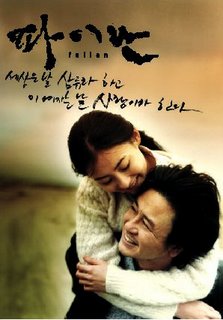 The theme of lovers separated by distance, physical or otherwise, has been tackled again and again since the beginning of cinema. In Asian Film, recently there's been Korea's Calla, Il Mare and Ditto, Shunji Iwai's Love Letter (one of my favorite movies) the Ken Zhu starrer Sky of Love and the the recent Filipino offering Moments of Love.
The theme of lovers separated by distance, physical or otherwise, has been tackled again and again since the beginning of cinema. In Asian Film, recently there's been Korea's Calla, Il Mare and Ditto, Shunji Iwai's Love Letter (one of my favorite movies) the Ken Zhu starrer Sky of Love and the the recent Filipino offering Moments of Love.Failan, a kind of Chinese-Korean joint venture, tackles the concept, but ends up becoming something far different from the above. At first what seems like a Korean gangster movie turns into a touching character piece about a man on the edge of his life facing (and ultimately, regretting) the choices he has made. I won't cut corners and tell you that you will find the content emotionally affecting; bring box of kleenex or two, you may need it. This film is no commonplace tearjerker, this is perhaps one of the greater films of the past few years.
Since enjoyment and analysis of the movie kinda depends on the story, Spoilers follow. You've been warned.
Despite the title, we are first introduced to Lee Kangjae (Choi Minshik, delivering a brilliant performance, as always), a low level gangster relegated to inane tasks like extorting store owners or hocking porn. He's been a gangster for some time now, but he's still the rank he is while his other friends have become bosses, and his supposed subordinates treat him with no respect. He acts tough but is all talk; in truth he doesn't have the heart of a gangster. This goes on for half an hour, portraying a dark and seedy world that is harsh and unforgiving. This section of the film portrays Kangjae in an unflattering light, and we, the audience think of him in a negative way.
One day something really bad happens, and he is given the choice to take the rap for his gangster boss friend in exchange for something that he's always wanted. However, before the time comes, he is told that his 'wife,' Failan has just died.
Here we are introduced to Failan, played by Cecilia Cheung (recently of the Promise, here in a rare at the time crossover), a gentle, kind woman who came to Korea to search for her relatives. The search does not end up as expected, and she ends up working as a laundry woman under a paper marriage - to Kangjae. Although Kangjae is her husband only on paper (and true to his character, Kangjae forgets the whole thing later,) his simple act matters much to Failan, and treasures the only thing he left her - his picture and his red scarf (ironically, something that Kangjae had shunned because the color didn't look good on him.) Here the tone of the movie changes significantly, and as Kangjae goes to where his wife finally rests, he grows more and more attached to the one person who had seen him, acknowledged him as a person. Here we begin to rethink our perception of Kangjae, we pity him for his unfortunate situation, of a possibility of something that will now never happen.
Separated by distance, we could speculate that perhaps Failan was only in love with a mere perception of Kangjae; we know better, after having seen the first part of the film. But what if she really did see something special in this seemingly worthless man that so many others had neglected? To me it seems like a vicious cycle - from the people around Kangjae who spurned him, to Kangjae himself initially thinking little of Failan and forgetting about her. Failan, who is pure and saintly, never thinks of her spouse negatively, even when he virtually never sees her alive except for one time.
It sounds implausible, I know; falling in love with an idealization. But we have crushes all the time - to become infatuated with someone that we do not truly understand. I think when we do so, we see the best in people, beneath the surface, into something that other people do not see. And this realization, in my opinion, is what drives Kangjae closer to Failan (in this case, his idealization of her - and in our case, we know how she is.)
The climax and denouement of the film is heart-rending as the pieces fall into place. I knew that the end was inevitable, and Failan's song at the end is haunting. I personally could not stop watching the film as the credits rolled, and even as the film had stopped.
The acting in the movie is superb. It goes without mention that Choi Minshik is one of Korea's most talented actors. He radiates his emotions, his every movement and action flowing with sorrow, almost like Takeshi Kitano, whose deadpan face still communicates emotion even when it's... deadpan. Cecilia Cheung does a good job as Failan, although her character could have used more development. The music suits the occasion well, and the technically the film succeeds well.
In the end, I prefer to think that Kangjae had been saved; for a brief moment in his life, someone had seen something in him that even he may not have noticed. Failan is an unforgettable film that makes you think about the little things in life that you may take for granted.
No comments:
Post a Comment